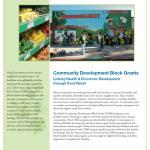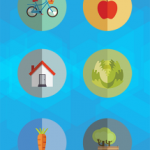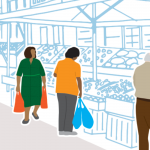Understanding the Role of Community Development Finance
For improving access to healthy food
Community Development Financial Institutions (CDFIs) provide financial services and credit to benefit underserved neighborhoods.
Because a growing number of CDFIs are financing the development of grocery stores and other food retail options in underserved communities, they have become an important partner for public health advocates seeking to increase access to quality, affordable food.
Many factors contribute to the grocery store gap in low-income urban and rural communities. Evidence suggests that supermarket developers and operators face higher costs associated with land assembly, construction, workforce training, and security in urban areas compared to suburban areas.
Rural grocers face additional barriers, including limited access to the wholesale food distribution network; declining populations; transportation challenges; and competition from regional shopping centers. These higher costs, coupled with thin operating margins, can make it difficult for supermarket developers and operators to secure loans.
ChangeLab Solutions, in collaboration with The Food Trust, developed this guide to discuss CDFIs as an alternative to conventional lending for financing supermarkets and other small businesses.







